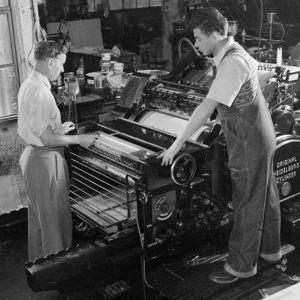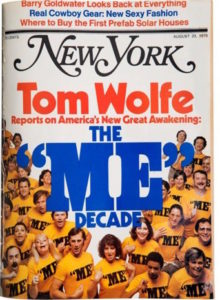
When I was growing up, we were told never to trust anyone over 30. Today it seems that my generation won’t trust anyone under 30. I hear complaints from industry members that young people today, millennials, are immature and spoiled, are obsessed with technology, and are noncommittal, job-hopping from one employer to another. While these accusations may ring true to you, the truth is millennials aren’t going anywhere. So, what can you do to recruit a quality employee?
I believe there are two factors that need to be considered when talking about millennials. First, are the statements made about millennials true? And second, because you have no choice but to hire millennials, how do you bring somebody into your company and make them productive?
First, let’s first examine some of the accusations against millennials.
Millennials are immature and spoiled
It’s important to realize that the younger generation has never measured up to the standards set by the older generation. Living over 2,400 years ago, Socrates believed, “The children now love luxury; they have bad manners, contempt for authority; they show disrespect for elders and love chatter in place of exercise.” Some things never change.
To my fellow baby boomers, I’d like to remind you that in August of 1976 it was Tom Wolfe on the cover of New York magazine who declared our generation the “Me Generation.” We earned that title due to our perceived narcissism.
It was in the 1970s that many of today’s health and exercise fads started. Have you forgotten the tracksuits we used to wear and the self-help books that were everywhere? What about “mood rings” that would let everyone around you know how happy or sad you were? Remember the big yellow Happy Face logo from the 60s that was popularized during the 70s, or the t-shirts with the big red heart that said, “I love New York.” Were those the “emojis” of the 1970s?
You may be saying to yourself, “Well, that’s not how I acted.” So, maybe you weren’t self-centered. Perhaps this was just a stereotype. But that’s how you and your friends were perceived.
Millennials are obsessed with technology
Now let’s take a minute and talk about millennials and technology. Take a look at this Stanley Kubrick photograph shot on a New York subway in 1946. In it we see people using the technology of the day. Most of these subway riders have their heads buried in their newspaper and seem to be having little or no interaction with their fellow passengers. Is this any different than millennials with their heads buried in their cell phones?
In the 1970s, some parents installed an additional landline in their home because their children were always on the phone. Is it any wonder that the “Call waiting” feature we currently have on our mobile phones was developed and implemented in the 1970s?
Technology has changed. How hard it is for you to embrace new technology and how easy do millennials adapt to new technology? Could that be a benefit to you and your company?

Millennials are noncommittal
Let’s look at another stereotype about millennials. Many employers say that they are noncommittal, job-hopping from one employer to another. You may be surprised to learn that some of these beliefs come from a 2016 LinkedIn post. In his article, Guy Berger stated that over the last 20 years job-hopping has nearly doubled. While it’s true that millennials in the Media & Entertainment, Professional Services, and other industries changed jobs often within their first five years after college, millennials in Manufacturing, Industrial, Auto, and other sectors actually had less job movement.
Broader data shows that when you look at the overall labor market in the U.S. people are actually changing jobs less these days. Doug Weber, an associate professor of economics at Temple University said, “The notion that the number of jobs that people are going to have throughout their life is increasing drastically, is actually false.” He says, “If you look over the past 10 to 15 years, the rate of churn has gone down.”
A study from Pew Research found that millennials aren’t job-hopping any faster than previous generations. In fact, millennial workers are just as likely to stick with their employers, as their older counterparts in Generation X were when they were young adults. So, if millennials are leaving your company, there may be something else going on.
Millennials aren’t going anywhere
This brings me to my second point. You have no choice but to hire millennials so how do you bring somebody into your company and make them productive? The best way I can answer this question is to relate the experience of a PIASC member who has found success in hiring and keeping millennials at his company. The interesting thing is, he never set out to hire millennials.
Doug Rawson is President & CEO of Superior Lithographics, an award-winning packaging printer of litho labels and folding cartons. Doug tells the story of how, in 2012, his VP of Operations brought employees together in small groups to discuss what was important to them for Superior to be a top-notch employer, customer, and supplier. It took a while to list, distill, digest, and refine their responses. When Doug and his leadership team were finished, they had found a winning combination.
Remember, Doug’s goal was not to find a way to hire millennials. His goal was to find hard-working individuals who would show up to work on time, and who would, once a given task was completed, would ask, “What’s next.” He was looking for behavioral patterns and personality traits that are needed in a quality employee.
Doug discovered that the qualities he wanted in a good employee were the same qualities that had to be integrated into his company’s culture. These qualities are expressed in Superior’s Six Core Values:
- Safety
- Respect
- Quality
- Communication
- Teamwork
- Creativity
If you compare this list to a list of things millennials are looking for in a rewarding career, you’ll find they match.
Millennials, like most of us, want to feel their thoughts and opinions matter. They want to be respected.
Millennials are looking for a positive work environment that instills a sense of community, creates transparency, and encourages collaboration amongst employees.
Millennials are the most educated generation ever. They challenge convention. They want to find new and better ways of doing things. This is a hard thing for many employers to understand.
Many owners of today’s printing companies started at the bottom and worked their way up. They started sweeping the floor, and today they run the company. The truth is, many of the entry-level jobs of the past no longer exist. We can’t expect young people today to start at the bottom.
Millennials are natural collaborators. Everything from their education in kindergartens to their participation in social media has turned them into team players. This, too, is hard for old school employers to understand. They tell employees what to do and how to do it. There’s little room for questions and collaboration. That won’t work with millennials. To be honest, that attitude would not work with me. I want to be treated as an individual. I wanted to participate in the solution and not just be handed a set of tasks. I wanted answers to my “why” questions that were not “because I told you so.”
Doug found that by incorporating Superior’s Six Core Values into his company’s culture and requiring his employees to stand by these values in all they do, millennials were naturally drawn to his company.
For example, if an employee has an idea, they are free to express and explore it. Doug says, “Just because we’ve always done something a certain way doesn’t mean we have to do it that way this time.” Sometimes it works, sometimes it doesn’t. Doug is willing to accept failure as long as the employee followed the six core values.
That doesn’t mean someone can mess up a job repeatedly. Failure is not the same as a bad job. If an employee is doing a lousy job, that’s unacceptable, and there will be consequences. It does mean that people have a chance to try something different which gives them autonomy. Without autonomy employees are continually running to the supervisor or boss asking, “Is this right?” “Is this ok?” Then the supervisors become overwhelmed, and everything breaks down.
Room to fail is another thing millennials look for in an employer. Millennials want to work for a business that embraces opportunities to take risks and either reap the rewards or learn from failures. Millennials look for managers who encourage failure and mentor them through the process of learning from it.
By showing respect, requiring quality results, and developing teamwork through good communication, Superior Lithographics has not just succeeded in recruiting quality employees, who happen to be millennials; they have created employees that are self-sufficient. They’ve been so successful that even though Superior runs a 24/7 operation, the supervisory staff is only on-site 8:00 a.m. to 5:00 p.m. Monday through Friday.
The Me Generation vs. Generation Me
It seems to me that many of the stereotypes that people had about baby boomers in the 1970s were not really true. It also appears that some of the accusations made about Generation Me, the millennials, may not be true. When looking for a quality employee, employers need to keep an open mind and appreciate the qualities that millennials bring to the table.
And, in today’s job market, it’s essential for employers to understand that millennials have greater choices than we did in the past. Today’s job interview works both ways. Prospective employees are also evaluating the prospective company and, in today’s information age, they are able to see reviews through such sites as Glassdoor. What does your company and its employees have to offer a young person who’s not looking for a job but a career in the printing and graphics industry?


